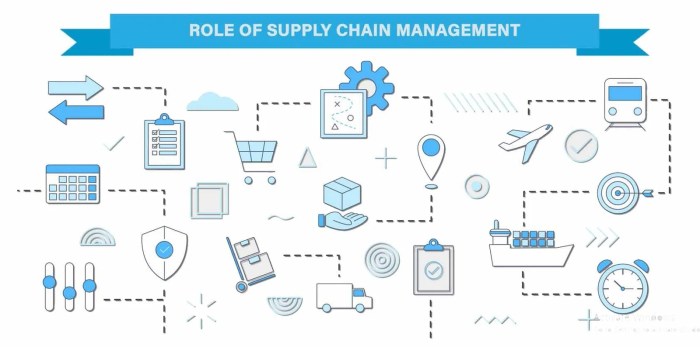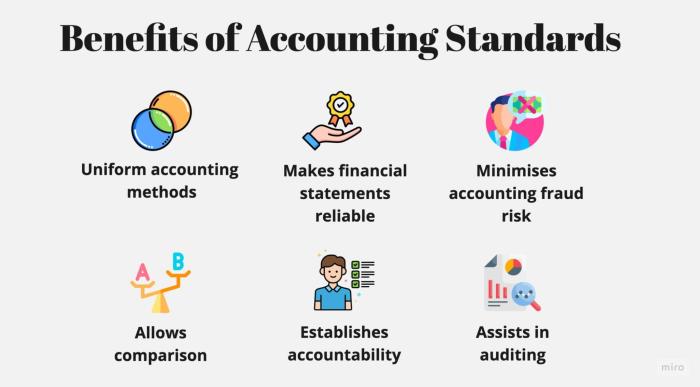The Importance of Ethical Accounting Practices sets the stage for a critical examination of financial integrity. This exploration delves into the core principles of ethical accounting, highlighting the significant impact of both ethical and unethical practices on various stakeholders, from investors and creditors to employees and the company’s overall reputation. We will analyze the crucial role of transparency, accountability, and robust internal controls in maintaining financial health and preventing irregularities. Furthermore, we’ll investigate the evolving influence of technology on ethical accounting and the vital role of ethical leadership in fostering a culture of integrity within accounting firms.
Understanding ethical accounting isn’t just about adhering to rules and regulations; it’s about building trust, ensuring fairness, and promoting the long-term sustainability of businesses and the financial system as a whole. This discussion will cover the legal and regulatory framework surrounding ethical accounting, exploring real-world examples and highlighting the potential consequences of unethical behavior.
Defining Ethical Accounting Practices
Ethical accounting practices are the bedrock of a trustworthy and transparent financial system. They ensure that financial information is accurate, reliable, and presented fairly, allowing stakeholders to make informed decisions. These practices go beyond simply adhering to legal requirements; they involve a commitment to integrity, objectivity, and professional competence.
Ethical accounting principles are built upon several core tenets. These include honesty and transparency in all financial reporting, maintaining objectivity and avoiding conflicts of interest, and upholding professional competence through continuous learning and development. Accountants are expected to act with due diligence, ensuring the accuracy and completeness of financial statements, and to maintain confidentiality regarding sensitive financial information. Adherence to these principles fosters trust among stakeholders, including investors, creditors, and the public.
Examples of Ethical Dilemmas in Accounting
Ethical dilemmas in accounting are often complex and nuanced, forcing professionals to navigate difficult situations. One common example involves pressure from management to manipulate financial results to meet specific targets. This could involve recognizing revenue prematurely, understating expenses, or manipulating inventory valuations. Another dilemma arises when an accountant discovers fraudulent activities within the organization. The ethical obligation is to report the wrongdoing, potentially facing repercussions from those involved. A third example is the conflict of interest that can occur when an accountant provides services to multiple clients with competing interests. Maintaining objectivity and confidentiality in such situations is paramount.
The Role of Professional Accounting Bodies in Setting Ethical Standards
Professional accounting bodies, such as the American Institute of Certified Public Accountants (AICPA) and the Institute of Chartered Accountants in England and Wales (ICAEW), play a crucial role in establishing and enforcing ethical standards within the accounting profession. They develop comprehensive codes of conduct that guide accountants’ professional behavior, providing clear guidelines on ethical responsibilities. These bodies also offer continuing professional development programs that educate accountants on ethical issues and best practices. Furthermore, they investigate allegations of unethical conduct and impose sanctions on members who violate their codes of conduct, maintaining the integrity of the profession.
Potential Consequences of Unethical Accounting Practices
The consequences of unethical accounting practices can be far-reaching and devastating. For individuals, these can include fines, imprisonment, and damage to professional reputation. Organizations involved in unethical accounting may face legal action, significant financial penalties, loss of investor confidence, and damage to their brand reputation. This can lead to decreased market value, difficulty securing loans, and ultimately, business failure. On a broader societal level, unethical accounting practices erode public trust in financial markets and institutions, undermining the stability and efficiency of the economy. The Enron and WorldCom scandals serve as stark reminders of the devastating consequences of widespread unethical accounting.
The Impact of Ethical Accounting on Stakeholders: The Importance Of Ethical Accounting Practices
Ethical accounting practices significantly influence the confidence and trust placed in a company by various stakeholders. Transparency, accuracy, and adherence to accounting standards foster positive relationships, while unethical practices can lead to severe consequences for all involved parties. The impact ripples through the entire business ecosystem, affecting investors, creditors, employees, and the company’s overall reputation.
Impact on Investors
Ethical accounting practices are crucial for attracting and retaining investors. Transparent and accurate financial reporting allows investors to make informed decisions about their investments. They can assess the company’s financial health and potential for future growth with greater confidence. Conversely, unethical accounting practices, such as manipulating earnings or hiding liabilities, erode investor trust and can lead to significant financial losses for investors and damage to the company’s market value. Investors rely on accurate financial statements to evaluate risk and potential returns, and dishonest reporting undermines this foundation of trust.
Impact on Creditors
Creditors, including banks and other lenders, rely heavily on a company’s financial statements to assess its creditworthiness. Ethical accounting provides creditors with a clear and accurate picture of the company’s financial position, enabling them to make informed decisions about lending. Accurate financial information minimizes the risk of default and protects the creditors’ investments. Conversely, unethical accounting can mislead creditors, leading to bad loan decisions and potential financial losses for the lending institutions. Hidden debts or inflated assets can severely impact a creditor’s ability to recover their loans.
Benefits of Ethical Accounting for Employees
Ethical accounting fosters a positive work environment and contributes to employee morale and loyalty. Employees working in an organization with strong ethical standards feel more secure and confident in the company’s future. This translates to increased productivity and reduced employee turnover. Conversely, a culture of unethical accounting can create a climate of distrust and anxiety, leading to decreased morale, increased stress, and ultimately, a less productive workforce. Employees may be hesitant to raise concerns about unethical practices for fear of retribution.
Ethical vs. Unethical Accounting: Reputation
A company’s reputation is directly linked to its accounting practices. Ethical accounting builds trust and credibility with all stakeholders, enhancing the company’s image and attracting customers, investors, and talented employees. A strong reputation translates to a competitive advantage in the marketplace. Conversely, unethical accounting practices can severely damage a company’s reputation, leading to loss of business, legal repercussions, and difficulty attracting and retaining talent. Once trust is broken, it is incredibly difficult to regain. The long-term costs of unethical accounting practices often far outweigh any short-term gains.
Comparative Impact of Ethical and Unethical Accounting Practices
| Stakeholder Group | Ethical Accounting Impact | Unethical Accounting Impact | Examples |
|---|---|---|---|
| Investors | Increased confidence, informed investment decisions, higher returns | Loss of trust, inaccurate valuation, financial losses | Enron’s collapse due to fraudulent accounting practices vs. Apple’s transparent reporting attracting investors. |
| Creditors | Reduced risk of default, informed lending decisions | Increased risk of default, financial losses for lenders | A company with accurate financial statements securing a loan easily vs. a company with hidden liabilities facing loan rejection. |
| Employees | Increased morale, job security, positive work environment | Decreased morale, job insecurity, stressful work environment | A company known for its ethical practices attracting and retaining top talent vs. a company with a history of accounting scandals experiencing high turnover. |
| Company Reputation | Enhanced credibility, increased customer loyalty, strong brand image | Damaged reputation, loss of customers, legal repercussions | Johnson & Johnson’s ethical response to the Tylenol crisis vs. WorldCom’s accounting scandal leading to bankruptcy. |
Maintaining Transparency and Accountability
Maintaining transparency and accountability is paramount in ethical accounting. It fosters trust among stakeholders, strengthens the firm’s reputation, and ultimately contributes to long-term financial stability. Without these crucial elements, the integrity of financial reporting is compromised, leading to potential legal repercussions and erosion of public confidence.
Ensuring transparency and accountability requires a multifaceted approach encompassing robust internal controls, clear communication strategies, and a commitment to ethical conduct at all levels of the organization. This involves proactively disclosing relevant financial information, implementing rigorous internal audit procedures, and fostering a culture of ethical decision-making.
Methods for Ensuring Transparency in Financial Reporting
Transparency in financial reporting is achieved through clear, concise, and readily understandable communication of financial information. This involves providing comprehensive disclosures that go beyond the minimum legal requirements, presenting data in a user-friendly format, and making information readily accessible to stakeholders. Methods include using plain language in financial statements, providing detailed notes and explanations, and using visual aids like charts and graphs to simplify complex data. Regularly published financial reports, including quarterly and annual statements, are vital, as is the timely disclosure of any material events that could impact the company’s financial position. Furthermore, providing access to relevant data through a secure online portal allows stakeholders to easily access and review information. This proactive approach ensures that all relevant financial information is readily available to interested parties.
Designing Internal Control Systems to Prevent and Detect Accounting Irregularities
Robust internal control systems are the cornerstone of preventing and detecting accounting irregularities. These systems should incorporate segregation of duties, regular reconciliations of accounts, and independent audits. Segregation of duties ensures that no single individual has complete control over any aspect of the accounting process, minimizing the risk of fraud. Regular reconciliations help identify discrepancies between internal records and external statements. Independent audits provide an external verification of the accuracy and reliability of financial reporting. Implementing strong internal controls involves establishing clear policies and procedures, providing appropriate training to staff, and regularly reviewing and updating the system to adapt to changing circumstances. For example, implementing a system of dual authorization for significant transactions can significantly reduce the risk of unauthorized payments or entries. Regularly rotating staff responsibilities further reduces the risk of fraud or errors.
Implementing a Robust Ethics Program within an Accounting Firm
Implementing a robust ethics program involves a multi-step process. First, a comprehensive code of ethics needs to be developed and communicated to all employees. This code should clearly Artikel the firm’s values and expectations regarding ethical conduct, including specific examples of acceptable and unacceptable behavior. Second, regular ethics training should be provided to all staff, covering relevant accounting standards, professional codes of conduct, and internal policies. Third, a confidential reporting mechanism should be established, allowing employees to report potential ethical violations without fear of retaliation. This could involve a dedicated ethics hotline or an anonymous online reporting system. Fourth, a process for investigating and resolving ethical complaints should be implemented, ensuring fairness and impartiality. Finally, the firm should regularly review and update its ethics program to reflect changes in legislation, best practices, and internal needs. For example, the firm might conduct periodic ethics audits to assess the effectiveness of the program and identify areas for improvement. Such a program demonstrates a strong commitment to ethical conduct and helps maintain public trust.
Best Practices for Maintaining Accurate and Reliable Financial Records
Maintaining accurate and reliable financial records requires meticulous attention to detail and adherence to established accounting principles. Best practices include using standardized accounting software, implementing a robust document management system, and regularly backing up data. Utilizing standardized software ensures consistency and reduces the risk of errors. A well-organized document management system makes it easy to locate and retrieve necessary information when needed. Regular data backups protect against data loss due to hardware failure or other unforeseen events. Furthermore, regular reconciliation of bank statements, accounts receivable, and accounts payable is crucial for identifying discrepancies and preventing errors. Implementing strong internal controls, as discussed earlier, is also integral to maintaining accurate and reliable financial records. Finally, conducting regular internal audits and external reviews provides an independent verification of the accuracy and reliability of the financial information. The implementation of these best practices ensures that financial records accurately reflect the financial position of the organization.
The Role of Technology in Ethical Accounting
Technology plays a transformative role in modern accounting, offering significant opportunities to enhance ethical practices while simultaneously presenting new challenges. The integration of technology can streamline processes, improve accuracy, and bolster transparency, ultimately contributing to a more robust and reliable accounting system. However, it’s crucial to acknowledge and mitigate the potential risks associated with technological advancements in this field.
Technology’s capacity to enhance ethical accounting practices is substantial. Automated systems can reduce human error, a common source of accounting irregularities. Real-time data analysis facilitates quicker identification of anomalies and potential fraudulent activities. Furthermore, the use of blockchain technology can enhance the security and transparency of financial transactions, creating an immutable record that is difficult to tamper with. This increased transparency and traceability fosters trust among stakeholders and helps maintain accountability.
Enhanced Data Security and Privacy in Accounting Systems
Data security and privacy are paramount in ethical accounting. Robust technological solutions are necessary to protect sensitive financial information from unauthorized access, breaches, and misuse. This includes implementing strong encryption protocols, multi-factor authentication, and regular security audits. Data loss prevention (DLP) tools can monitor and prevent the unauthorized transfer of sensitive data. Furthermore, compliance with regulations like GDPR and CCPA is crucial to ensure the ethical handling of personal data. Regular employee training on data security best practices is also essential. A comprehensive approach to data security involves a combination of technological safeguards and strict adherence to internal policies and procedures.
Detection and Prevention of Fraud Using Technological Tools, The Importance of Ethical Accounting Practices
Technology offers powerful tools for detecting and preventing accounting fraud. Advanced analytics techniques, such as machine learning and artificial intelligence, can identify patterns and anomalies indicative of fraudulent activities that might otherwise go unnoticed. These systems can analyze vast datasets to pinpoint unusual transactions, inconsistencies in financial reporting, and other red flags. Real-time monitoring systems can flag suspicious activities immediately, allowing for prompt investigation and intervention. Furthermore, robust internal control systems, supported by technology, can help prevent fraud from occurring in the first place by automating processes, enhancing segregation of duties, and providing a clear audit trail. For example, a system could automatically flag any transaction exceeding a pre-defined threshold without proper authorization.
Ethical Concerns Arising from Accounting Software and AI
While technology offers numerous benefits, ethical concerns arise from its implementation. The reliance on sophisticated accounting software and AI algorithms can lead to a reduction in human oversight, potentially increasing the risk of errors or malicious manipulation going undetected. Bias in algorithms, if not carefully addressed, can lead to unfair or discriminatory outcomes. Furthermore, the potential for data breaches and misuse of sensitive information poses significant ethical challenges. Maintaining transparency and accountability in the use of AI in accounting is crucial to ensure fairness and prevent bias. Regular audits and independent verification of AI-driven processes are essential to mitigate these risks. For example, an AI system trained on biased data might incorrectly flag legitimate transactions from specific demographics as fraudulent.
Promoting Ethical Culture in Accounting Firms

Cultivating a strong ethical culture within an accounting firm is paramount for maintaining public trust, ensuring accurate financial reporting, and fostering a positive and productive work environment. This involves a multi-faceted approach encompassing leadership commitment, robust training programs, and clear communication of ethical expectations. A culture of ethics isn’t merely a set of rules; it’s a shared understanding and commitment to acting with integrity in all aspects of the profession.
Creating and maintaining an ethical environment requires a conscious and sustained effort from all levels of the organization. It’s not enough to simply have a code of conduct; the firm must actively promote and reinforce ethical behavior through various initiatives. This includes clear communication of expectations, providing resources and support for ethical decision-making, and establishing a culture of open communication where employees feel comfortable raising concerns without fear of reprisal.
Ethical Leadership in Accounting Firms
Ethical leadership is the cornerstone of a strong ethical culture. Leaders who consistently model ethical behavior, communicate ethical values clearly, and hold themselves and others accountable for their actions create an environment where ethical conduct is expected and rewarded. This includes actively promoting diversity and inclusion, fostering open communication, and providing opportunities for professional development and growth. Leaders who prioritize ethical decision-making, even when faced with difficult choices, send a powerful message to their teams. For example, a leader who prioritizes client confidentiality above personal gain or who refuses to compromise professional standards for financial incentives demonstrates the importance of integrity.
The Importance of Ethics Training and Education for Accountants
Comprehensive ethics training is crucial for equipping accountants with the knowledge and skills necessary to navigate ethical dilemmas. This training should go beyond simply outlining rules and regulations; it should focus on developing critical thinking skills, promoting ethical reasoning, and providing practical guidance on resolving ethical conflicts. Effective training programs often incorporate case studies, interactive workshops, and role-playing exercises to help accountants apply ethical principles to real-world scenarios. For instance, training might involve analyzing scenarios involving conflicts of interest, bribery, or fraudulent reporting, and discussing appropriate responses. Continuing professional development (CPD) courses specifically focused on ethics are also essential to keep accountants abreast of evolving standards and best practices.
Effective Methods for Encouraging Ethical Behavior
A robust system of checks and balances is necessary to ensure ethical conduct. The following methods are highly effective in promoting ethical behavior among accounting professionals:
- Establish a clear and concise code of conduct that Artikels ethical expectations and provides specific examples of acceptable and unacceptable behavior.
- Implement a robust whistleblower protection policy that encourages employees to report ethical violations without fear of retaliation.
- Regularly conduct ethics audits to assess the effectiveness of ethical programs and identify areas for improvement. These audits should not just be compliance checks, but also involve assessing the ethical culture within the firm.
- Provide regular ethics training and education to all employees, including senior management. This training should be tailored to the specific roles and responsibilities of each employee.
- Promote a culture of open communication and feedback, where employees feel comfortable raising ethical concerns without fear of reprisal.
- Reward ethical behavior and hold individuals accountable for unethical conduct. This might include recognition programs, promotions, or disciplinary actions, as appropriate.
- Establish an independent ethics committee to review ethical violations and provide guidance on ethical issues.
- Foster a culture of transparency and accountability, where all decisions and actions are documented and subject to review.
The Legal and Regulatory Framework of Ethical Accounting
Ethical accounting practices are not merely aspirational goals; they are legally mandated requirements supported by a robust framework of laws and regulations. These frameworks aim to ensure transparency, accountability, and the protection of investors and the public interest. Failure to adhere to these standards can result in significant legal and financial repercussions for individuals and organizations.
The legal and regulatory landscape governing ethical accounting is complex and varies somewhat across jurisdictions, but several core principles and bodies consistently play a crucial role. These regulations often build upon generally accepted accounting principles (GAAP) or International Financial Reporting Standards (IFRS), providing a detailed structure for financial reporting and auditing.
Relevant Laws and Regulations
Numerous laws and regulations directly impact ethical accounting practices. These include securities laws, which aim to prevent fraud and ensure accurate financial disclosures to investors. Examples include the Sarbanes-Oxley Act of 2002 (SOX) in the United States, which significantly strengthened corporate governance and financial disclosure requirements in response to major accounting scandals. Similar legislation exists in many other countries, often tailored to their specific financial markets and legal systems. Furthermore, tax laws and regulations are also deeply intertwined with ethical accounting, as accurate and honest reporting is essential for fair tax assessment. Failure to comply can lead to significant tax penalties and legal action. Beyond these specific laws, general business laws, such as those relating to fraud and misrepresentation, also apply to accounting practices.
The Role of Regulatory Bodies
Regulatory bodies are vital in enforcing ethical accounting standards. In the United States, the Securities and Exchange Commission (SEC) plays a central role in overseeing publicly traded companies, ensuring compliance with securities laws and investigating potential accounting irregularities. The Public Company Accounting Oversight Board (PCAOB) oversees the audits of public companies, setting auditing standards and inspecting accounting firms. Internationally, organizations like the International Accounting Standards Board (IASB) set global accounting standards, while various national regulatory bodies enforce these standards within their respective jurisdictions. These bodies utilize a range of enforcement mechanisms, including investigations, audits, sanctions, and legal proceedings.
Penalties for Violating Ethical Accounting Standards
Penalties for violating ethical accounting standards can be severe and far-reaching. These can include significant financial penalties, both for the company and individual accountants involved. Criminal charges, including fraud and conspiracy, are also possible, leading to imprisonment. Civil lawsuits from investors and other stakeholders who suffered losses due to unethical accounting practices are common. Beyond these legal repercussions, reputational damage can be devastating, impacting a company’s ability to attract investors, secure loans, and maintain customer trust. Professional sanctions, such as license revocation for accountants, can also result from serious ethical breaches.
Examples of Unethical Accounting Practices Leading to Legal Consequences
Several high-profile cases illustrate the severe consequences of unethical accounting practices. The Enron scandal, involving the manipulation of accounting records to hide massive debts, resulted in the company’s bankruptcy and numerous criminal convictions. Similarly, WorldCom’s fraudulent accounting practices, involving the improper capitalization of expenses, led to a massive accounting restatement and criminal charges against executives. These cases highlight the significant risks associated with unethical accounting practices and the importance of strong regulatory oversight and robust internal controls. The consequences extend beyond financial losses; they damage public trust in financial markets and institutions.
Outcome Summary
In conclusion, the Importance of Ethical Accounting Practices cannot be overstated. Maintaining ethical standards is paramount for fostering trust, ensuring financial stability, and promoting the overall health of the economy. By embracing transparency, accountability, and robust internal controls, organizations can mitigate risks, protect stakeholders, and cultivate a positive reputation. The integration of technology and a strong ethical culture within accounting firms further strengthens the foundation of ethical accounting, paving the way for sustainable and responsible financial practices. The ongoing commitment to ethical principles is not merely a compliance issue; it is a cornerstone of a successful and trustworthy business environment.
Essential FAQs
What are some common signs of unethical accounting practices?
Common signs include inconsistent financial reporting, lack of transparency, unexplained discrepancies, unusual transactions, and a disregard for internal controls.
How can whistleblowers protect themselves from retaliation when reporting unethical accounting practices?
Whistleblowers should utilize confidential reporting channels, document all evidence thoroughly, and seek legal counsel to understand their rights and protections under relevant laws.
What is the role of an audit committee in promoting ethical accounting?
Audit committees provide oversight of the financial reporting process, ensuring independence and objectivity in audits, and promoting a culture of ethical conduct.
How can technology help prevent accounting fraud?
Technology, such as advanced analytics and AI-powered systems, can identify anomalies, detect patterns indicative of fraud, and automate internal controls for enhanced accuracy and efficiency.
Browse the multiple elements of How to Handle Business Tax Audits Effectively to gain a more broad understanding.








